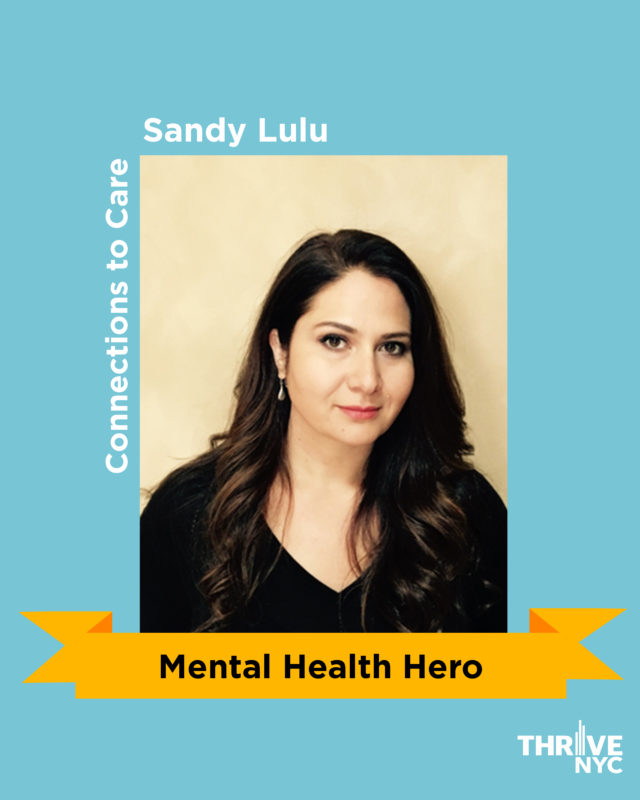Connections to Care – Mental Health Integration in Community-Based Organizations: Radiating energy and positivity
 Sandy Lulu, an Arab-American woman, grew up speaking Arabic, which enabled her to have a strong connection to her community and culture. Today, Ms. Lulu is a licensed clinical social worker at Family Health Centers of NYU Langone, where she provides services to the most vulnerable communities.
Sandy Lulu, an Arab-American woman, grew up speaking Arabic, which enabled her to have a strong connection to her community and culture. Today, Ms. Lulu is a licensed clinical social worker at Family Health Centers of NYU Langone, where she provides services to the most vulnerable communities.
When Ms. Lulu first learned of the opportunity to partner with the Arab American Association of New York (AAANY) to support building their mental healthcare services through Connections to Care (C2C), she knew she had to be part of the project. Over the past five years, Ms. Lulu helped design and expand the Mental Health Program at AAANY, proving to be a perfect fit. She has given 110% of her effort and worked tirelessly for her community by providing essential services during the COVID-19 pandemic – a most challenging period.
Before the COVID-19 pandemic began, Ms. Lulu’s first task with AAANY consisted of getting their staff up to speed on mental health basics so they could integrate a mental health approach in their day-to-day interactions with clients. Ms. Lulu trained all staff members and volunteers on psychoeducation, motivational interviewing, Mental Health First Aid, and screening and assessing clients for mental health needs. She ensured that cultural and linguistic sensitivity were at the forefront of every training.
When the COVID-19 pandemic struck, AAANY staff were prepared to respond to mental health needs in the community, thanks to the efforts of Ms. Lulu and other team members. In addition to training and coaching staff, Ms. Lulu began providing support to the social workers-in-training and the case managers at AAANY. Ms. Lulu designed and co-led workshops for participants on mental health awareness, domestic violence, and substance use issues during COVID-19, and shared educational information with her clients so they could protect themselves from the virus. Looking ahead to the long-term mental health effects of the pandemic, Ms. Lulu also spearheaded an effort to educate people on the importance of remaining engaged in mental health services as a community to protect their physical and mental health.
Furthermore, Ms. Lulu made sure that systems and tools were in place to address her clients’ immediate and long-term mental health needs. She established referral partnerships with other community providers at NYU Langone, specifically with other mental health professionals who spoke Arabic and understood the Arabic Community. Additionally, she volunteered in food distribution, providing essential basic nutrition packages to those experiencing food insecurities. Ms. Lulu’s pioneering work at AAANY has provided the structure and blueprint in place to meet their clients’ mental health needs during this pandemic and its unseen effects.
“I don’t know anyone who will go to the extent that Sandy will go for the community,” said Dr. Joseph Laino, Assistant Director of Clinical Services at Family Health Centers of NYU Langone Sunset Terrace. “She identifies as part of the community herself, and she’s so committed they get the services they need. She’ll get up at 5 in the morning to polish a PowerPoint presentation. She just radiates energy and positivity.”
From Ms. Lulu:
“As a Palestinian-American woman and a clinical social worker, I find myself in a position of privilege to serve my community. The guiding principles of compassion, preventing hardship, and empowering others are core cultural and spiritual values that have been instilled in me since childhood. I wouldn’t be able to do the work that I do without the support of the fantastic team of AAANY, my colleagues, friends and family. I am humbled by this honor.”
Community mental health program: Connections to Care: Mental Health Integration in Community-Based Organizations
ThriveNYC partners with the Mayor’s Office for Economic Opportunity to integrate mental health support into the work of community-based organizations (CBOs) serving at-risk and low-income communities across the City. Through Connections to Care, CBO partners work with mental health providers who train and coach staff to screen their clients for mental health needs, offer direct support when appropriate, and link to local health providers for further care if needed. The program is operated in partnership with the Department of Health and Mental Hygiene, with additional funding through the Mayor’s Fund to Advance New York City and other private funders. Nearly 2,000 community-based staff have been trained through the program, and more than 46,000 New Yorkers have received screening or other services. More than 80 percent of clients referred to mental health services at the height of the pandemic (April through June 2020) kept their appointment. Learn more about the program and its impact here.